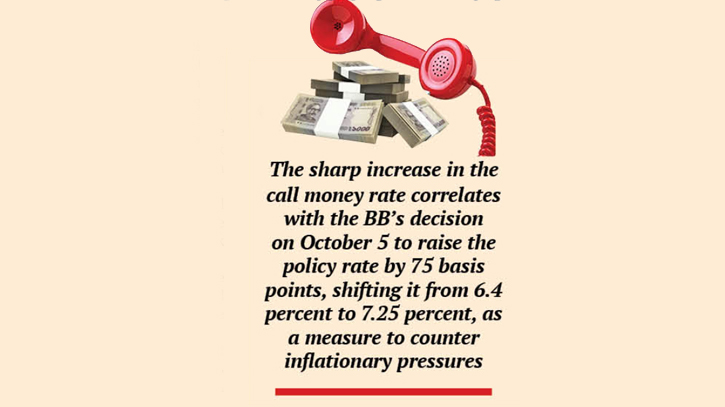
Photo : collected
Due to the liquidity crisis, the interbank call money rate surged to 9 percent on Thursday, up from 6.56 percent on October 4, following an increase in the policy rate by the Bangladesh Bank (BB). The interbank transaction totaled Tk 2,769 crore on Thursday.
However, bankers said that the call money rate skyrocketed, which is the reason for the downturn in interbank lending.
Increased liquidity pressures have led to a steady rise in the weighted average call money rate since June when it stood at 6 percent.
The call money rate is the interest rate on a short-term or overnight loan from one bank to another to meet an urgent requirement.
The lending rate ceiling in banks reached nearly 11.4 percent in December, up from 10.7 percent in October.
The sharp increase in the call money rate correlates with the BB's decision on October 5 to raise the policy rate by 75 basis points, shifting it from 6.4 percent to 7.25 percent, as a measure to counter inflationary pressures.
Subsequently, on November 26, 2023, the policy rate (repo) was further raised by 50 basis points to 7.75 percent.
The move was in line with the central bank’s introduction of an interest rate corridor in its monetary policy statement on July 18, which allows the interbank call money rate to fluctuate around the policy rate.
With these measures, the BB has opted for a more restrictive approach to currency supply, aiming to control inflationary pressures.
Despite the central bank's efforts, inflation at the national level, recorded by the Bangladesh Bureau of Statistics (BBS), was reported at 9.49 percent in November, up from 9.93 percent in October, primarily driven by escalating prices of essential commodities.
The BBS recorded inflation on a point-to-point basis at 9.49 percent in November at the national level, compared to 9.93 percent in October, driven by escalating prices of essential commodities.
Banks typically resort to emergency loans like call money to rectify asset-liability mismatches, fulfill statutory CRR and SLR requirements, and respond to sudden surges in fund demands.
According to BB data, the weighted average rate was 5.80 percent in December 2022, compared with 4.88 percent in June of the same year.
The call money rate began its sharp ascent after March 21, 2022, when it stood at 2.05 percent, according to BB data.
Bankers said that the government’s increased borrowing from the banking system, BB’s dollar sales to banks to settle import bills, and a rise in treasury bill rates were stressing the liquidity.
The rise in inflation also created credit demand, they said.
Managing Director of Mutual Trust Bank Syed Mahbubur Rahman told The Daily Messenger, “There is a huge shortage of liquidity, which has become obvious in high-rate lending. Due to the dollar crisis and high inflation, ahead of the election, there is a tightening liquidity crisis, especially for government borrowing from commercial banks.”
The excess liquidity in the banking sector dropped to Tk 1.6 lakh crore in October from Tk 1.7 lakh crore in September.
The liquidity crisis dipped private sector credit growth to 9.69 percent in September, a 23-month low.
The BB has sold a substantial amount of dollars from the country’s foreign currency reserves to mitigate the prevailing dollar crisis.
The central bank utilised the country’s foreign currency reserves, selling approximately $27 billion over the past 29 months.
Of this amount, $5.8 billion was allocated to banks in July-November of FY 2023-24, $13.5 billion in FY23, and $7.62 billion in FY22.
The dollar sales, in turn, mopped up equivalent local currency from the banking system.
Due to the dollar sales, the gross foreign exchange reserves in Bangladesh, according to International Monetary Fund guidelines, dropped to $19.1 billion on Wednesday from $23.25 billion on August 31.
The exchange rate rose sharply to Tk 110 from Tk 91 against the US dollar within a year.
Messenger/Fameema








